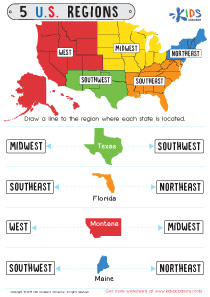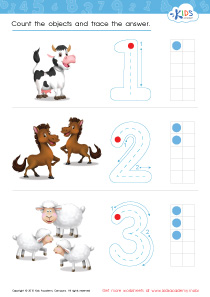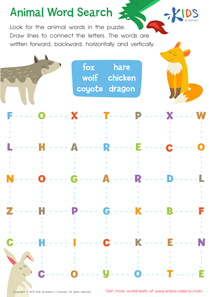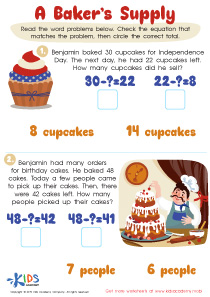Logic and Early Math Lessons | 6 & 7 for Ages 4-5
12 results
Dive into the world of numbers with our engaging lessons on 6 & 7, specially designed for curious minds aged 4-5! Our interactive worksheets are crafted to capture young learners' attention, making learning not just effective but incredibly fun. Occasionally, we sprinkle in educational videos to bring concepts to life, alongside assessment quizzes to track progress. These lessons are the perfect blend of entertainment and education, ensuring your child grasps the basics of 6 & 7 while nurturing a love for learning. Join us on this exciting numerical adventure, tailored just for Ages 4-5!
Understanding early childhood education is crucial for setting up a strong foundation for lifelong learning. Our lessons on numerical concepts, particularly focusing on the numbers 6 & 7 for Ages 4-5, are meticulously crafted to cater to young learners at this pivotal stage of development. These lessons are not just another stepping stone in their educational journey but a significant leap towards grasping more complex mathematical concepts as they grow.
The significance of numbers in the early years cannot be overstated. They are the building blocks of math, a subject that permeates every aspect of our lives. By focusing on numbers 6 & 7, we aim to instill a deep-rooted understanding and appreciation for numbers in children aged 4 to 5 years. The interactive worksheets, educational videos, and assessment quizzes that constitute our lessons are not merely tools for learning; they are windows to a world of numerical wonders that await eager young minds.
Interactive worksheets are a cornerstone of our teaching approach. These are not just pieces of paper with numbers; they are thoughtfully designed activities that engage children in a hands-on learning experience. Through tracing, counting, and coloring exercises related to numbers 6 & 7, kids develop fine motor skills alongside their numerical abilities. The tactile experience of holding a pencil and interacting with the worksheet materializes abstract concepts into tangible learning moments, making the understanding of numbers 6 & 7 an enjoyable and memorable experience.
In addition to worksheets, educational videos play a vital role in our teaching methodology. These videos bring numbers to life through engaging animations and stories that captivate young minds. Children aged 4 to 5 are at a stage where their imagination knows no bounds, and our videos are designed to harness this imaginative power. By presenting numbers 6 & 7 through relatable characters and scenarios, we ensure that these numerical concepts are embedded in their memory, aiding in their long-term retention.
Assessment quizzes, though the term might sound daunting, are far from it in our educational approach. These quizzes are carefully crafted to be age-appropriate and are infused with elements of fun and challenge that encourage kids to apply what they've learned about numbers 6 & 7. The goal is not to assess for the sake of evaluation but to reinforce their learning in an interactive manner. This feedback loop helps educators and parents alike understand the child's grasp of the concepts and tailor further instruction to their needs.
Integrating these elements into our lessons on numbers 6 & 7 for Ages 4-5 ensures a holistic learning experience. It's not just about counting; it's about understanding the significance of numbers in the world around us. Our approach fosters a love for learning, critical thinking, and problem-solving skills from a tender age, setting the stage for academic success and beyond.
In conclusion, our lessons on numbers 6 & 7 for Ages 4-5 are more than just educational content; they are a journey into the fascinating world of numbers. Through interactive worksheets, educational videos, and assessment quizzes, we aim to kindle a lifelong passion for learning in young children, laying a solid foundation for their future academic endeavors and beyond.




















